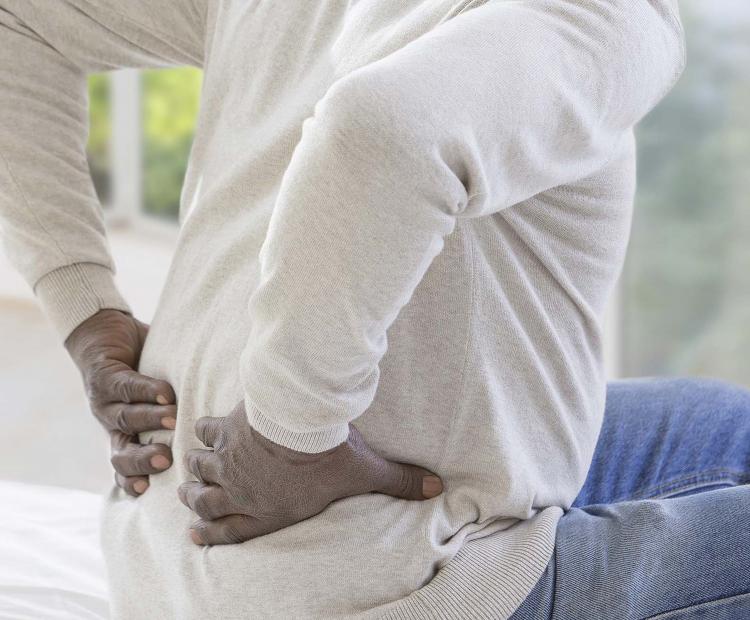Six Things to Avoid with Degenerative Disc Disease
Degenerative disc disease is a common condition among adults that can lead to chronic pain and reduced mobility. The good news? Understanding what to avoid can help manage the condition, prevent further damage, and reduce pain—making it possible to maintain an active, fulfilling life.
To find the best treatment for managing degenerative disc disease, call us today at (480) 573-0130 or contact us online.
What is Degenerative Disc Disease?
Degenerative disc disease is a naturally occurring condition that happens as people age. Disc degeneration can sometimes lead to pain, weakness, or numbness. In fact, as many as 90% of people over the age of 60 have at least some degeneration.
Disc degeneration can cause spinal discs to thin, crack, or bulge. As the cushioning between bones diminishes, bone spurs may develop and pinch nearby nerves. This can occur in any part of the spine, including the neck (cervical), upper back (thoracic), or lower back (lumbar).
What are the Symptoms of Degenerative Disc Disease?
Despite its name, degenerative disc disease is not an illness but a gradual process of wear and tear on the discs over time. While it may not always cause symptoms, it can impact daily life depending on the location and extent of the damage. Common symptoms include:
- Chronic neck pain and back pain
- Numbness and tingling
- Weakness
- Difficulty walking
- Loss of bladder and bowel control
Severe pain is the most common symptom and can interfere with quality of life.
What Activities Should be Avoided with Degenerative Disc Disease?
When diagnosed with degenerative disc disease, avoiding activities that can worsen the condition and accelerate disc degeneration is important. Here are things to avoid:
1. Improper Lifting
Heavy lifting and lifting with the wrong technique can further strain worn spinal discs. It’s important to minimize these impacts by limiting heavy items and observing proper lifting techniques. Those with degenerative disc disease should also follow any work restrictions recommended by a healthcare provider.
2. High Impact Sports and Exercises
These include anything that causes repetitive vertical impact or jarring of the spine. Common high-impact activities to avoid include:
- Football
- Basketball
- Soccer
- Baseball/softball
- Tennis
- Volleyball
- Jogging
- Deadlifting weights
3. Sudden or Excessive Twisting
Twisting places stress on spinal discs. Avoid activities like golf, yoga, and sports that involve fast or repetitive twisting.
4. Sitting for Long Periods
Prolonged sitting can worsen symptoms due to increased spinal pressure. Get up frequently, especially during work, travel, or TV watching.
5. Bad Posture and Slouching
Poor posture increases spinal stress. Improve sitting and standing posture, and avoid unsupportive furniture.
6. Poor Sleeping Positions or Support
Sleeping on your stomach or on an unsupportive mattress can worsen symptoms. Use a medium-firm mattress and sleep on your back or side with knee support.
Degenerative Disc Disease Self-Care and Lifestyle Changes
In addition to avoiding strain, these changes can help:
1. Walking Daily
Walking is low-impact and helps reduce stiffness. Avoid prolonged sitting by walking throughout the day.
2. Swimming
Swimming reduces pressure on the spine and helps build strength safely.
3. Physical Therapy
Proper physical therapy can help improve posture and strength to support the spine.
4. Stop Smoking
Smoking damages spinal discs. Learn more about how smoking affects spine health.
5. Avoid Inflammatory Foods
Reduce red meat, processed meats, sugar, white flour, and fried foods. Focus on whole grains, leafy greens, fruits, lean proteins, and omega-3s.
Read more: Johns Hopkins Anti-Inflammatory Diet
Also see: Nutrition for Degenerative Disc Disease
6. Maintain a Healthy Weight
Extra weight increases spinal wear and tear. Research shows a BMI over 25 increases lumbar disc degeneration risk.
Treatments for Degenerative Disc Disease
When lifestyle changes aren't enough, your provider may recommend:
- Epidural steroid injections
- DISC procedure
- Laser-assisted neural decompression
- Bracing
- Surgery
- Medications
Each person’s case is unique. At Advanced Spine and Pain, we can help determine the best course of treatment for long-term relief. Contact us or call (480) 573-0130 to get started.

